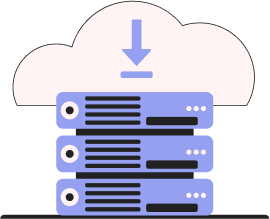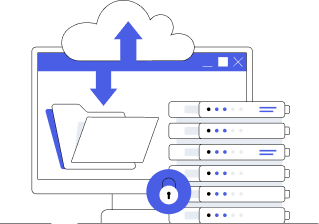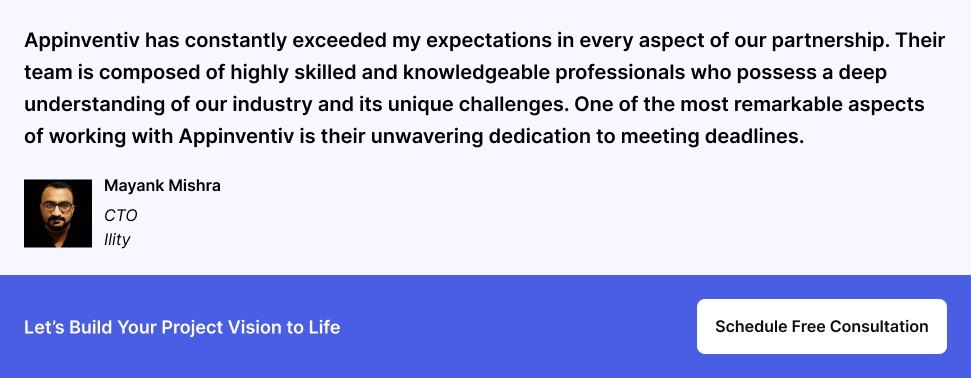- 10 Transformative Applications and Advantages of AI in Cloud Computing
- 1. AI-Powered Healthcare Platforms
- 2. AI-Driven Fraud Detection in Financial Services
- 3. AI-Enhanced Retail Personalization
- 4. Cloud-Based Predictive Maintenance in Manufacturing
- 5. AI in Cloud-Based Supply Chain Optimization
- 6. AI-Powered Virtual Assistants for Customer Service
- 7. AI for Data-Driven Product Innovation
- 8. AI in Cloud for Predictive Analytics in Marketing
- 9. AI-Enhanced Cloud Security Solutions
- 10. AI-Powered Intelligent Automation for Operations
- Real-World Example of AI in Cloud: Fueling Digital Future
- Google Cloud AI
- PayPal
- Amazon
- Siemens
- Coursera
- How to Implement AI in Cloud Computing Successfully: Challenges and Solutions
- Data Privacy and Compliance
- Integration Complexities
- Managing AI Biases
- The Glorious Future of AI in Cloud Computing
- Edge AI
- Quantum Computing
- Explainable AI
- Leverage the Power of AI in Cloud Computing with Appinventiv
- FAQs
Key takeaways:
- AI in cloud computing offers unparalleled scalability and accessibility for advanced analytics.
- Enterprises are leveraging artificial intelligence in cloud computing for significant gains in efficiency, security, and customer experience.
- Key applications range from AI-powered healthcare to predictive maintenance, showcasing the diverse use cases of AI in cloud computing.
- Addressing challenges like data privacy and integration complexities is crucial for the successful integration of AI in cloud computing.
- Appinventiv specializes in delivering custom AI cloud solutions development services to propel businesses forward.
The entire business world is being turned upside down, and what used to be futuristic has now become an incredible reality.
- A healthcare provider can predict patient deterioration a full 48 hours in advance.
- A retailer personalizes shopping experiences for millions of customers, all in real-time.
- A finance company stops fraud attempts before a single dollar goes missing.
This isn’t science fiction anymore. It is the profound, tangible impact of AI in cloud computing, directly empowering enterprises across every sector.
According to McKinsey’s latest research, companies that successfully leverage artificial intelligence in cloud computing will have a staggering $3 trillion of EBITDA value by 2030. Clearly, the convergence of AI and cloud computing is not just tweaking how businesses operate; it’s fundamentally redefining what’s even possible.
Just look at Microsoft’s impressive journey, with Azure AI’s revenue run rate soaring to $13 billion and growing a phenomenal 175% year-over-year. This highlights the explosive adoption of AI in cloud computing.
Yet, despite all this momentum, a recent 2024 study by BCG reveals that a significant 74% of companies are still struggling to show impressive value from their AI efforts.
The real hurdle here isn’t the technology itself—it’s the strategy behind it. Organizations are no longer asking how to implement it effectively, but critically, what cloud computing with AI can do to drive measurable business outcomes.
As organizations scale their AI workloads beyond traditional cloud infrastructure, AI gigafactories as next-generation compute hubs are emerging as purpose-built facilities that can support the intensive training requirements of large language models and enterprise AI applications.
Bother not. This comprehensive blog is here to help. Here we will explore ten transformative applications that are actively reshaping industries, all backed by benefits and real-world examples, aimed to help decision-makers confidently navigate this revolutionary landscape.
Ready to unlock similar results for your business?
10 Transformative Applications and Advantages of AI in Cloud Computing
The convergence of AI and cloud technology isn’t just another tech trend; it’s actually revolutionizing entire industries. If you observe companies across various sectors, you will realize that the changes are quite remarkable. To give you a broader picture, here are the ten transformative ways cloud computing with AI is shaking things up in different industries:
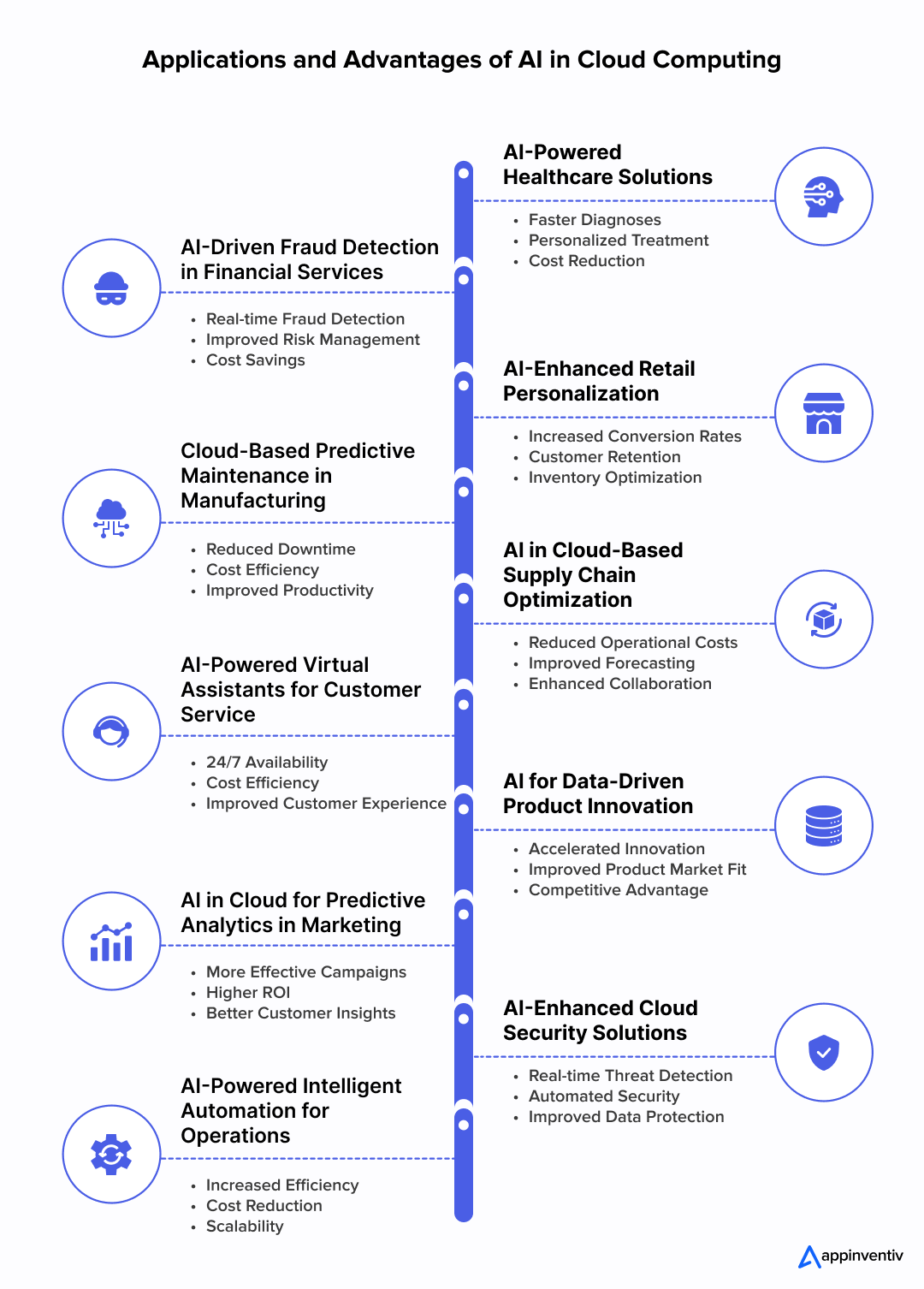
1. AI-Powered Healthcare Platforms
Application: The healthcare industry is witnessing a revolution, all thanks to the applications of AI in cloud computing. From cutting-edge diagnostic tools to accelerating the pace of drug discovery, the ways these applications are being used are simply immense. The whole concept of AI and cloud computing in healthcare means they can actually make sense of those massive patient files and scan results without drowning in the piles of paperwork.
Benefits
- Faster Diagnoses: An AI system in healthcare can spot something sketchy in an X-ray faster than your morning coffee gets cold. We are talking about cutting diagnosis time from days to minutes.
- Personalized Treatment: This is where the role of artificial intelligence in cloud platforms gets really interesting. Instead of the same cookie-cutter treatment for everyone, doctors can now tailor everything to what actually works for each patient’s specific situation.
- Cost Reduction: Nobody likes paperwork, right? Well, AI handles all that tedious data entry work, which means hospitals can actually allocate resources to things that matter, rather than hiring armies of staff to perform administrative tasks.
2. AI-Driven Fraud Detection in Financial Services
Application: Banks and payment companies have always been targets for the evil guys, but now they’re fighting back with some serious use cases of AI in cloud computing. Banks have become quite sneaky with their AI models, which reside in the cloud, constantly monitoring every transaction like hawks. They’re basically playing detective 24/7, catching the bad guys before they can run off with anyone’s money.
Benefits
- Real-time Fraud Detection: AI in FinTech is like having a super-powered security guard who never blinks. These systems catch weird transactions faster than you can say “identity theft.”
- Improved Risk Management: Instead of crossing their fingers and hoping for the best, banks can see trouble coming from miles away and take preventive action instantly.
- Cost Savings: When machines handle the grunt work of watching for fraud, banks don’t need as many people staring at screens all day, which saves everyone money.
3. AI-Enhanced Retail Personalization
Application: Ever wonder how Amazon seems to know exactly what you want to buy? That’s AI in cloud computing working behind the scenes. Retailers are getting scary good at reading what we want before we even know we want it. AI and ML in cloud computing dig through everything—what you clicked, what you bought, even what you looked at but didn’t buy.
Benefits
- Increased Conversion Rates: When a website suggests something you actually want instead of random junk, you’re way more likely to hit that “buy now” button.
- Customer Retention: People stick around when stores “get” them. It’s like having a personal shopper who remembers your style and budget.
- Inventory Optimization: No more guessing games about what to stock. AI tells retailers exactly what people will want and when they’ll want it.
Also Read: How AI in Retail Improves Shopping Experiences
4. Cloud-Based Predictive Maintenance in Manufacturing
Application: In manufacturing, machine breakdowns are basically nightmares. Downtime costs serious money, which is why cloud computing and AI have become such a big deal for these companies. Now, instead of waiting for machines to break down, managers can utilize cloud computing and AI in manufacturing to predict when issues are about to arise. AI and Machine learning in cloud computing analyze all the unusual sounds, vibrations, and temperature fluctuations to provide early warnings.
Benefits
- Reduced Downtime: Nothing kills productivity like a broken machine in the middle of a big order. Now they can fix stuff during scheduled breaks instead of emergency shutdowns.
- Cost Efficiency: Fixing a small problem before it becomes a big one? That’s just AI makes it possible, preventing minor issues from escalating into costly major failures.
- Improved Productivity: When machines aren’t randomly breaking down, everything runs smoother and deadlines become way less stressful.
5. AI in Cloud-Based Supply Chain Optimization
Application: Supply chains used to be mysterious black boxes where stuff went in one end and, hopefully, came out the other. Now, companies utilize cloud computing with AI in the supply chains to monitor what’s happening at every step, from the factory floor to your doorstep.
Benefits
- Reduced Operational Costs: AI tends to highlight areas where companies are wasting money. This can be a valuable action point for companies to cut costs.
- Improved Forecasting: Remember the toilet paper shortage? Yeah, AI in demand forecasting could prevent such chaos and help companies stock the right stuff at the right time.
- Enhanced Collaboration: Cloud-based AI tools enable everyone in the supply chain to communicate directly with each other, eliminating the need for multiple systems to relay information.
6. AI-Powered Virtual Assistants for Customer Service
Application: Customer service is getting a major upgrade. Thanks to chatbots and virtual assistants powered by cloud computing using artificial intelligence. It simply means that conversational AI cloud systems can actually understand what you’re asking and give helpful answers.
Benefits
- 24/7 Availability: Your problem doesn’t care if it is 3:00 AM on Sunday or 2:00 PM on Monday. Now neither does customer service.
- Cost Efficiency: Companies can handle a much higher number of customer questions without hiring call centers with full staff, which keeps costs down for everyone.
- Improved Customer Experience: Getting instant help beats sitting on hold listening to elevator music any day of the week.
Also Read: AI in Customer Experience: Revolutionizing Business Growth
7. AI for Data-Driven Product Innovation
Application: Companies have realized they can utilize AI in the cloud to actually listen to what customers are saying by analyzing reviews, social media posts, and usage patterns. Cloud-powered AI for data visualizations analyzes all this feedback to determine what people truly want and unlocks dynamic insights.
Benefits
- Accelerated Innovation: Instead of guessing what features to build next, companies can follow the data breadcrumbs straight to what customers actually want.
- Improved Product Market Fit: Building stuff your users don’t want is expensive. But building things they actually want based on actual data is wise? That’s just smart business.
- Competitive Advantage: While competitors are still guessing, AI-powered companies are already building tomorrow’s must-have features.
8. AI in Cloud for Predictive Analytics in Marketing
Application: Marketing teams have acquired some advanced crystal ball technology. They’re using cloud computing and artificial intelligence to predict what you’ll want to buy before you even know you want it. AI in the cloud encompasses systems that monitor everything—your social media likes, shopping history, and even the duration of your gaze on specific ads. This enables data-driven advanced analytics to propel your business growth.
Benefits
- More Effective Campaigns: Instead of throwing ads at everyone and hoping something sticks, marketers can target people who are actually interested in their stuff.
- Higher ROI: Investing marketing dollars in individuals who are genuinely likely to make a purchase? It’s a game-changing concept.
- Better Customer Insights: AI tells marketers not just what users buy, but why they buy it, which is marketing gold.
9. AI-Enhanced Cloud Security Solutions
Application: Cybersecurity used to be like playing whack-a-mole with hackers—always one step behind. Now, cloud-powered AI in cybersecurity is changing the game, constantly watching for weird behavior and stopping threats before they can cause real damage.
Benefits
- Real-time Threat Detection: AI cloud services identify trouble faster than any human could, often stopping attacks before anyone even realizes they’ve occurred.
- Automated Security: Instead of security teams pulling all-nighters watching for threats, AI handles the mundane surveillance tasks so humans can focus on the more complex problems.
- Improved Data Protection: Better security means everyone sleeps better at night, knowing their personal information isn’t floating around the dark web.
10. AI-Powered Intelligent Automation for Operations
Application: Business operations are undergoing a significant transformation with AI automation residing in the cloud. We’re talking about AI cloud solutions development that takes care of all the repetitive, mind-numbing tasks that nobody wants to do anyway.
Benefits
- Increased Efficiency: When robots handle the mundane tasks, humans can focus on the more interesting work that truly requires creativity and problem-solving.
- Cost Reduction: Automating repetitive tasks means companies require fewer resources for data entry and can allocate more personnel to strategic thinking.
- Scalability: Need to handle twice as much work next month? AI in cloud computing models can scale up without requiring the hiring and training of additional staff.
Now that you are familiar with the applications and advantages of AI and cloud in transforming businesses, you are likely interested in leveraging these gains and seeking successful adoption strategies. Well, as a one-stop solution for all your digital woes, we are here to help. Read our comprehensive guide on how to adopt AI in business and make an informed decision that drives real results
Don’t let your business be deprived of these transformative advantages
Real-World Example of AI in Cloud: Fueling Digital Future
The theoretical advantages of AI in cloud computing certainly sound impressive on paper, but to truly grasp their sheer power, you really need to see them in action. Let me walk you through some compelling real-world examples where these technologies are making a tangible difference:
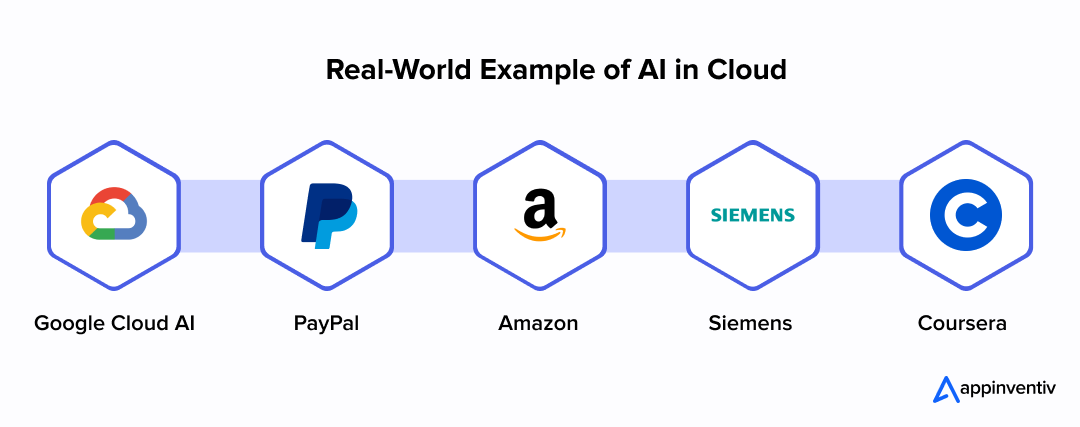
Google Cloud AI
Google Cloud has been collaborating with hospitals on a project that’s actually saving people’s sight. They’re using AI cloud services to scan eye photos and catch diabetic retinopathy way earlier than doctors could spot it manually. The cool part? This means patients get treatment before they start losing their vision. But wait, there’s more—they’ve also got AI systems in ICUs that can predict when a patient is about to take a turn for the worse, giving doctors a heads up before things get critical.
PayPal
PayPal processes insane amounts of transactions every day—we’re talking billions here. They leverage AI in cloud security systems, working around the clock, catching fraudulent activity as it happens. The crazy part? These systems learn from every single transaction, so they keep getting better at spotting new scam techniques. It’s already saved PayPal and its users millions of dollars in potential losses.
Amazon
Amazon wrote the book on this stuff. Their recommendation system runs on cloud-based AI services, and it’s scary good at figuring out what you want to buy next. It looks at everything—what you’ve bought before, what you’ve browsed, even what you put in your cart but didn’t buy. The result? More sales and happier customers who feel like the store actually “gets” them. It’s one of those AI in cloud examples that shows how this tech directly translates to more money in the bank.
Siemens
Siemens has figured out something pretty clever with their factories. They’re using AI and machine learning in cloud computing to predict when their equipment is about to fail. How? They’ve got sensors all over their machines feeding data to AI systems that can spot patterns humans would never catch. Instead of waiting for things to break, they fix problems during scheduled maintenance windows. The result? Way less downtime and much happier production managers.
Coursera
Coursera, a leading light in online learning platforms, cleverly uses AI in cloud services to tailor learning paths for students, recommending courses based on individual progress and career aspirations. They even provide automated feedback on assignments. This setup genuinely enhances the learning experience and makes quality education far more accessible and effective for a truly global audience. The essential role of AI in cloud computing here is its ability to seamlessly adapt to the unique needs of each individual learner.
How to Implement AI in Cloud Computing Successfully: Challenges and Solutions
While the benefits of AI in cloud computing are absolutely undeniable, let’s be real: actually weaving these incredibly powerful technologies into your operations isn’t always smooth sailing. There are definitely hurdles. But here’s the key – truly grasping these challenges, and more importantly, having clear, actionable solutions for them, is absolutely vital for any successful deployment.
Data Privacy and Compliance
Challenge: Handling sensitive cloud data with AI processing raises significant concerns about privacy, security, and compliance with regulations such as GDPR and HIPAA. Ensuring data sovereignty across regions becomes increasingly challenging.
Solution:
- Partner with an AI development company that complies with data privacy regulations.
- Implement strong encryption, access controls, and anonymization.
- Develop clear data governance and audit regularly.
Integration Complexities
Challenge: Plugging new AI and cloud platforms into existing legacy systems can be a daunting task. This often means compatibility headaches, data silos, and operational snags, demanding significant expertise.
Solution:
- Try a phased integration, starting small.
- Use API-driven architectures and microservices for smooth communication.
- Hire cloud consulting services to streamline integration and cut risks.
Managing AI Biases
Challenge: AI models are only as fair as their training data. Biased datasets can lead to unfair results, especially in areas like hiring or healthcare diagnostics.
Solution:
- Use rigorous data validation to spot and fix biases in training data.
- Follow responsible AI practices and regularly audit AI outputs for fairness.
- Build diverse AI development teams for broader perspectives.
The Glorious Future of AI in Cloud Computing
The path for AI in cloud computing points squarely to relentless innovation and expansion. We are truly at a pivotal moment where these technologies are quickly becoming fundamental to every business operation.
Edge AI
Edge AI stands out as a pivotal development, pushing computation to reside much nearer the data’s origin. The benefit? It drastically reduces both response times (latency) and network strain. For real-time applications such as IoT deployments or autonomous systems, this becomes absolutely vital. Additionally, meticulously designed AI models for specific industries will unlock deeper value. This unlocks more profound value, as evidenced in hyper-local retail analytics or the nuances of precision agriculture.
Quantum Computing
Quantum computing holds the profound potential to unleash computational capabilities unlike anything seen before. This advancement promises to propel artificial intelligence in cloud computing to an entirely new echelon. Picture AI tackling incredibly intricate problems or conducting complex economic simulations in mere moments. Such an exponential stride will undoubtedly reshape what is feasible, acting as a powerful catalyst for key AI and cloud computing trends that drive business growth.
Explainable AI
A critical focus moving forward involves AI’s ethical implications. Conversations concerning Explainable AI (XAI) benefits will mature, emphasizing transparency and clear accountability in AI decisions. Correspondingly, regulatory frameworks will need to evolve, ensuring that AI in cloud computing implementations remain both responsible and broadly advantageous for all stakeholders.
In essence, the future of AI in cloud computing will fundamentally be shaped by solutions that are not just more intelligent or specialized but also intrinsically ethical. Crucially, this entire framework will be effortlessly supported by the cloud’s inherently scalable and readily accessible infrastructure.
Leverage the Power of AI in Cloud Computing with Appinventiv
AI in cloud computing is undoubtedly transforming how businesses operate. It’s genuinely a game-changer for any enterprise aiming to truly flourish in this digital era. From fundamentally reshaping healthcare to ensuring financial security, and from crafting intensely personal retail experiences to fine-tuning sprawling supply chains, the advantages of AI in cloud computing are simply beyond dispute and incredibly widespread.
So, as a key decision-maker in your organization, the real question is not “Why is AI important to cloud computing”? It is definitely about embracing it smartly and strategically. And this is precisely where Appinventiv truly shines.
Why Partner with Appinventiv for Your AI in Cloud Journey?
When you choose Appinventiv, you gain a partner truly committed to your digital success. Our distinct strengths include:
- Comprehensive Expertise: We specialize in end-to-end AI and Cloud consulting services, covering AI strategy, custom AI/ML development, cloud migration, data analytics, and so on.
- Dedicated Team & Measurable Results: Our powerhouse team of 1600+ tech experts leverages deep industry insights to craft custom AI cloud solutions that are not only technically advanced but also meticulously aligned with your strategic business goals.
- Award-Winning Excellence: As an ISO-certified AI Development Company, we have consistently garnered numerous awards, like Times Business’ Tech Company of the Year 2023, Deloitte’s Consecutive Tech Fast 50 Awards in 2023 & 2024, and so on.
- Global Client Base: Our proven track record spans 3,000+ innovative solutions delivered for global clients like KFC, IKEA, Ility, YKA, and numerous Fortune 500 companies.
Partner with Appinventiv to unlock the full potential of AI and cloud computing, transforming your enterprise and propelling it toward unparalleled success.
FAQs
Q. What is AI cloud?
A. Simply put, AI in cloud computing means putting artificial intelligence capabilities and services right onto a cloud computing setup. This approach enables businesses to leverage powerful AI tools, ready-made models, and processing capabilities – all without requiring extensive, expensive hardware on their own premises or specialized in-house expertise. Essentially, it makes AI far easier to access and scale up.
Q. How is artificial intelligence transforming cloud computing?
A. AI makes the cloud infrastructure far smarter, much more efficient, and often quite autonomous. AI optimizes resource utilization, enhances security with real-time threat detection, automates various operational tasks, and delivers advanced analytics capabilities. Essentially, it turns the cloud from just a storage and processing platform into a truly intelligent, proactive environment.
Q. How is AI used in the cloud?
A. AI finds a huge range of uses in the cloud. From deep data analytics and training and deploying machine learning models, to natural language processing, computer vision, and automating tasks, AI plays a significant role in cloud infrastructure.
Q. What is an example of cloud AI?
A. For a really clear example of cloud AI, consider AWS SageMaker from Amazon Web Services. It gives developers and data scientists the tools to quickly build, train, and deploy their machine learning models. Another solid one is Google Cloud’s AI Platform, which offers all sorts of cloud-based AI services for tasks like language translation or recognizing images.
Q. How Does AI in Cloud Computing Change Business?
A. AI in cloud computing completely reshapes how companies operate by enabling them to make data-driven decisions, automate complex processes, craft personalized customer experiences, enhance cybersecurity, and drive innovation. All this translates directly into greater efficiency, lower costs, fresh revenue streams, and a much sharper competitive edge.
Q. How can AI in the cloud improve enterprise efficiency?
A. AI in the cloud enhances enterprise efficiency by automating tedious, repetitive tasks, optimizing resource utilization, delivering forward-looking insights for proactive decision-making, and streamlining workflows across your entire organization. The outcome? Faster operations, fewer human errors, and a far more nimble response to shifts in the market.


- In just 2 mins you will get a response
- Your idea is 100% protected by our Non Disclosure Agreement.
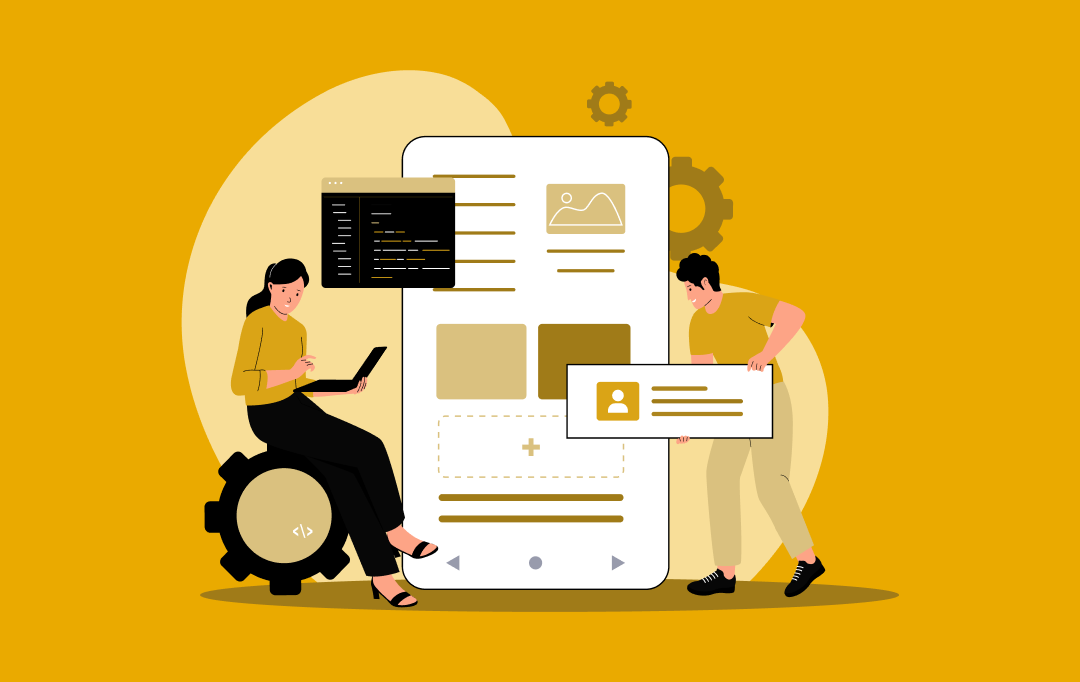
How Cloud Services Accelerate Product Development for Businesses
Key takeaways: Cloud product development changes the speed, cost, and risk profile of modern software delivery. The cost of cloud product development ranges between $40,000 and $400,000 or more. Cloud platforms give you instant access to AI/ML, edge computing, and advanced analytics without dropping tons of money upfront. Appinventiv supports enterprise cloud product development through…
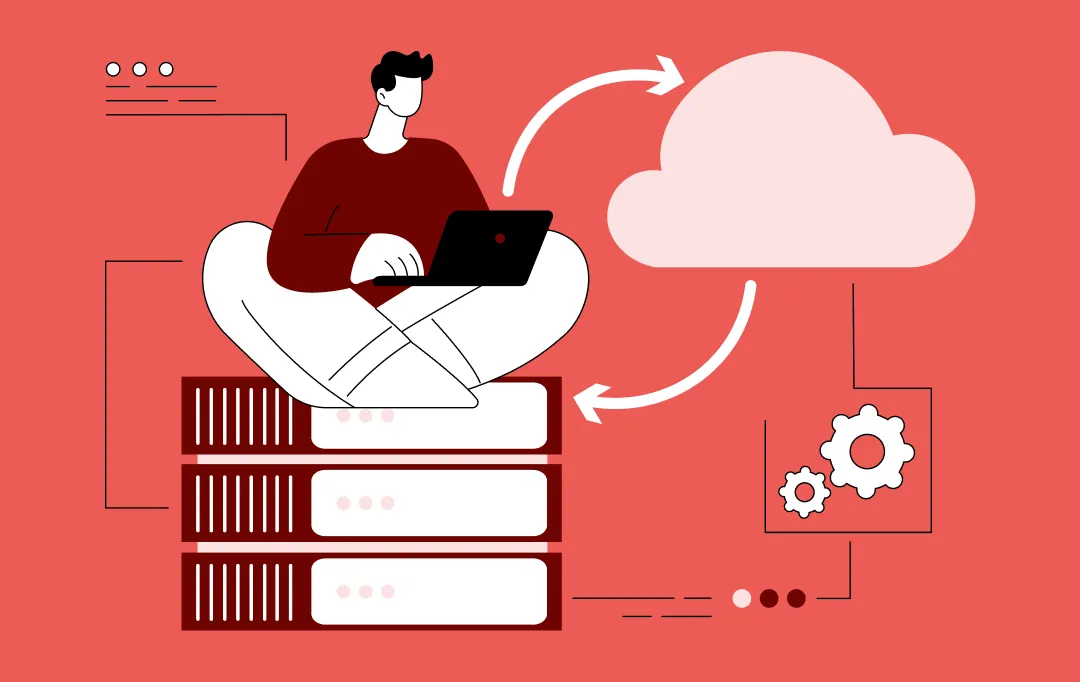
Green Cloud - How Cloud Adoption Helps Improve Sustainability/ESG Goals of Enterprises
Key takeaways: Adopting green cloud solutions lowers energy consumption, cuts emissions, and reduces operational costs. Companies like UEM Edgenta and Bharti Airtel have seen measurable improvements in sustainability and efficiency. AI Enhances Green Cloud Efficiency. AI optimizes energy use, predicts demand, and minimizes waste in cloud infrastructure. Your Green Cloud Roadmap. Start with an infrastructure…

Cloud Migration Strategy for Enterprises in Australia: Benefits, Implementation Process and Tools
Key takeaways: Cloud migration in Australia is accelerating as enterprises modernize aging systems and prepare for AI-driven workloads. Local cloud regions in Sydney, Melbourne and Brisbane make compliance and performance far easier for large-scale migrations. A strong cloud migration strategy for enterprises in Australia depends on clear assessment, the right tools and ongoing optimization. Industry…



























